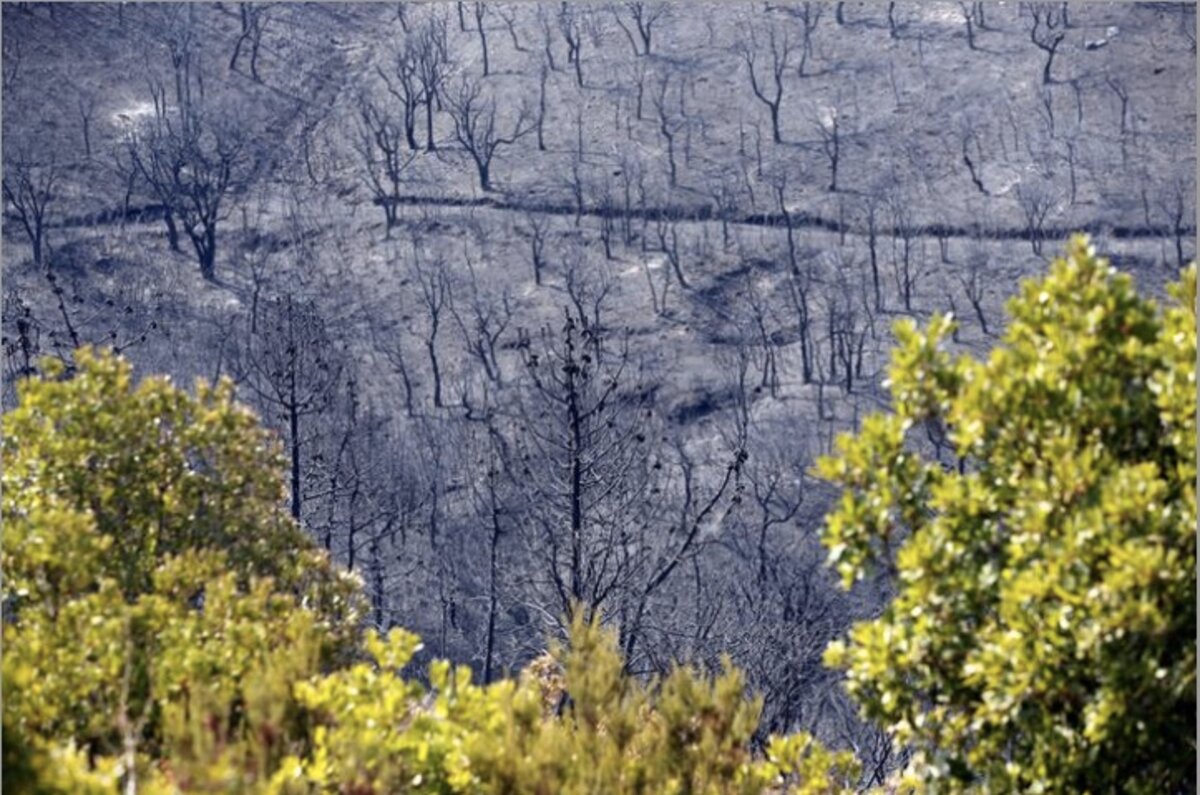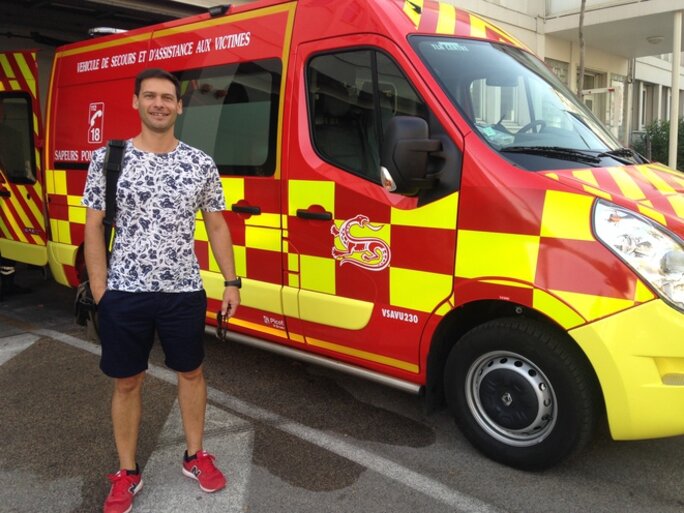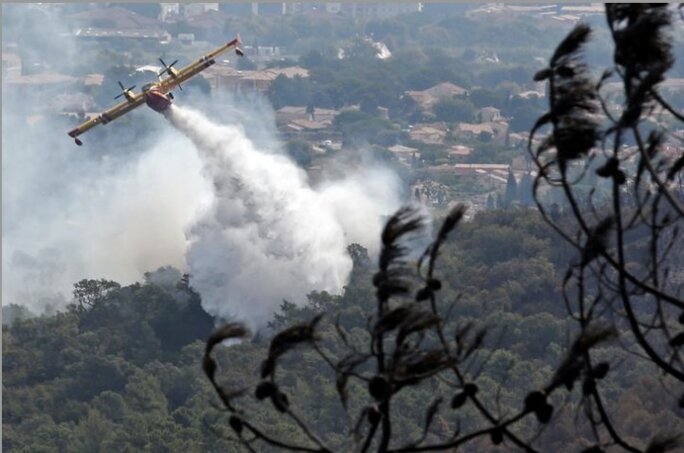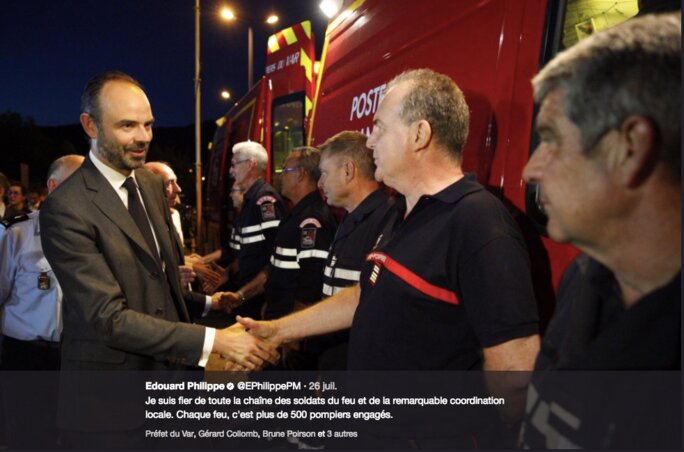It was 8 a.m. on Tuesday July 25th and Samuel had worked the night as duty officer at his fire station. Now he was to set off to relay his colleagues who had spent their night battling the flames that for several days had been consuming hectare upon hectare of the forests in the Var département of the Provence region in south-east France.
Samuel (last name withheld) would later that morning find himself fighting the wild fires near the village of Artigues, in the north-west sector of the département (county), then further south close to the village of Tourves. When the evening came, he had travelled south-east, fighting the flames that were closing in on the picturesque small town of Bormes-les-Mimosas, which overlooks the Mediterranean and swells with tourists during the summer months.
Samuel, a firefighting veteran of the devastating fires that broke out in the region in 2003, recalls looking, on his way, at the rising smoke that was blotting out the orange-tinted sky and thinking that it would become a major blaze.

Enlargement : Illustration 1

Throughout the evening, he and three firemen colleagues were posted to look after different strategic points, which include houses, occupied or empty, campsites, vineyards and agricultural sites. It was after nightfall when they were sent to secure a house in an isolated spot, where before long they found themselves encircled by the flames they were dousing. These reached up to 15 metres, and their truck’s reservoir of 4,000 litres of water was poorly matched to contain them.
The crew decided to get back in their truck, their eyes and lungs stinging. The flames soon licked around the vehicle and inside it the heat was so intense that plastic objects melted. They set off the emergency auto-protection system the vehicle was equipped with, and sped off through the inferno without any real idea of which direction would offer escape. Luckily, they found sanctuary in a vineyard.
When they were relieved the next morning, their colleagues found a haggard group still shocked by their close call with death. One of them was taken to hospital to treat respiratory problems from smoke inhalation. Such experiences can have profound psychological consequences, and their management offered the four firefighter immediate counseling from a professional psychologist, in order to pre-empt the risk of post-traumatic stress disorders.
Over the following days the firefighters in the Var were busy containing the different blazes, flooding the ground around the outskirts of the fires, setting up hoses some of which stretched 500 metres, and parking up convoys of fire trucks there where the flames had no yet reached.
A week later, Mediapart met up with a group of firemen at a café in Toulon, the large Mediterranean naval port that is also the principle town and administrative centre of the Var. Several of them were keen to speak of their bitterness at the high-profile visit made on July 26th by Prime Minister Edouard Philippe and interior minister Gérard Collomb, who met with firefighters after overflying the ravaged zones. “Because we are fed up with the nice image we’re given when there are forest fires”, said one.
Among them is Sébastien Jansem, the representative of an independent firemen’s union and the only one of the group who accepts to be identified with their last names in this article, the others explaining that they would otherwise expose themselves to possible sanctions from their hierarchy. “Before, we’d have a good row, we settled scores, and then it was finished,” said Éric in explanation. “Now it’s more pernicious, you’re refused training courses, you’re [professional] progression is blocked.” But they want to speak out about the problems they face. All of them have in mind the horrific events in 2003 when three of their colleagues in the Var found themselves trapped in their vehicle by a forest fire and were burnt to death near to the village of La Garde-Freinet, close to St. Tropez.
“If there were more vehicles, our management of the fires could have been better,” said Sébastien Jansem. The Var has one of the biggest fire brigade units of any French département, but the firemen told Mediapart that the maintenance of their fleet of trucks has deteriorated significantly. “At the fire station in La Seyne-sur-Mer [editor’s note: the second-largest town in the Var, situated beside Toulon], only one truck out of three was in operational condition at the moment when the fires broke out,” said Jean-Jacques. “One of them had been in repairs since June, over a problem of brake pads. And last year it was the same nonsense. The trucks came back from the garage on July 25th.”

Enlargement : Illustration 2

The men said their ageing trucks regularly break down, and the budget reductions mean that the repairs take longer to carry out, resulting in a lack of readiness of sufficient vehicles for the dry summer months when the worst wildfires occur. They also complained of how their squeezed budget has seen training courses delayed more and more.
What are called a “forest-fire intervention group” (which go by the acronym of “GIFF” in French) , made up of four firefighters, are assigned to each truck. “In 2003, there were 32 forest-fire intervention groups [in the Var],” said Jansem. “Today there are just 25.” In July this year, ten trucks were deployed for the fires raging around Artigues, and another 14 were deployed for the fires around Bormes-les-Mimosas. Jean-Jacques said the number at Antigues was insufficient. “As a result, there are more resumptions of fires.”
He said the ageing trucks and their equipment are increasing the danger for he and his colleagues at critical moments of fighting a blaze. “When the fire is powerful, and when the water takes several seconds more than usual to come out of the hose, you can feel them tick past. At Artigues, we heard the guys shouting very loudly. And fear is a bad influence, we lose our reflexes, we make mistakes that can have serious consequences.”
The state of the equipment is such that during the wildfires around Artigues, the firefighters had to call out the commercial tyre repair service Euromaster to change the tyres of one of the trucks. The current vehicles are due to end service in 2019, and what proportion will be replaced is uncertain.
'Things can’t continue very long like that'
The firefighters also rely on the backup of a fleet of aircraft operated by the national sécurité civile network, of which the fire services are a branch. The planes are used for water bombing of forest fires and dropping flame retardants. At the date of June 15th, the beginning of the dry season, the fleet was incomplete, lacking four Bombardier planes (the water bombers generally known as Canadairs), a Tracker and a Dash due to maintenance. The planes were still missing when the wildfires broke out one month later.

Enlargement : Illustration 3

Union representatives have accused the company that was given the maintenance contract in 2014, Sabena, of not fulfilling the terms of the deal. “And it was the same thing last year, we had to kick up a row in the media before our director-general banged his fist and obtained the planes” said Stéphan Le Bars, a water bomber pilot and representative of the principal union of the sécurité civile flight crews, the SNPNAC. Sécurité civile director-general Jacques Witkowski denied that maintenance delays were a problem, saying they “absolutely do not impact the operational capability of the fleet”.
In theory, the sécurité civile aircraft fleet can counter two separate wildfires 300 kilometres apart with six planes dealing with each blaze. But this July there were just four Bombardier water bombers available in mainland France and another two in Corsica. “The result is that while we usually manage to contain the fires to within 800, 900 hectares, the fire at Biguglia in Corsica devastated 2,200 hectares,” said Le Bars. “That’s enormous.”
The fleet has only 73 pilots out of what should be a full complement of 84, and since 2010, 27 have left the service. A pilot is not allowed to fly more than eight hours continuously. “As we don’t have a reserve crew we had to hold up the departures,” said Le Bars. “And while we don’t intervene, the fire does what it does.”
On the ground, the question of the numbers of firefighters is also an issue, as union representative Sébastien Jansem highlighted during our meeting with the firemen in Toulon. “All year round we operate with the numbers that we should have if there’s a strike,” he said. “At the station in Toulon, which is the largest in the Var, we have 23 firemen on duty during the day, 21 at night. In 2009, we numbered 960 across the department, today we number just 905 […] Before, there was a group appointed to each truck. Today there aren’t enough firemen. We can be posted to several vehicles at the same time, for example a fire truck, an ambulance [editor’s note: in France, firemen also have a role as emergency medics], and a light vehicle. And we go out with the first one that is required, which means that during the fires, it was necessary to replace personnel on the fire truck because those who were posted to it were on another mission.”
The reverse is also true. When the firemen are engaged in battling major blazes, there are fewer around to deal with other daily emergencies, or tasks like equipment inventories and vehicle maintenance.
In face of the under-staffing, the fire brigade in the Var, like elsewhere in France, relies on part-time trained volunteer firemen, who are mostly employed in other professional fields, and who make up the majority of its ranks. “In the fire station at Luc, which has 80 volunteers in all, they send 25 firemen to deal with blazes every day,” said Eric. “These people have another job elsewhere. Things can’t continue very long like that.”
His words echoed the account of Romain Pudal, a sociologist and volunteer fireman, in his 2016 book Retour de flammes. Les pompiers, des héros fatigués ? (‘Flashback: firefighters – tired heros?’) in which he analyses the workings and inside culture of France’s fire services (which Mediapart reviewed here). Puidal described how he had heard, for the first time, a senior fire officer during a television interview appeal to employers to release volunteer firemen from their usual professional tasks to free them up when needed for duty with the fire service. “That shows the limits of the voluntary system,” observes Pudal. “There is talk of the noble, magnificent side of the citizen’s commitment, but being a volunteer is more and more difficult.”
Voluntary firemen are mostly from blue-collar backgrounds, and increasingly exposed to short-term contract work and temping in their usual jobs outside the fire service. “Voluntary service is certainly a commitment, but it also becomes a source of revenue,” analyses Pudal. “Firemen [volunteers] are permanently dealing on one side with the fire station, and on the other with their work. That is why the model of the French sécurité civile can quickly reach its limits. In such conditions, the efficiency of the firemen is already somewhat miraculous.”
The numbers of volunteers signing up with the fire services is falling with every year, and Pudal argues that maintaining a volunteer fireman’s commitment to the service is difficult. “It’s a demanding, tiring activity which requires juggling things between several lives. So when a [volunteer] fireman leaves to carry out studies, has children or a job, they stop,” he says. Furthermore, with the freeze on hiring full-time professional firemen, voluntary service is no longer a path to becoming one.
“This year, about a thousand youngsters are going to lose the benefit of the qualifications they obtained three years ago because of the lack of recruitment,” said Sébastien Jansem. “in the Var, those in that situation must number around 40.”
Another complaint raised by the firemen Mediapart met in Toulon is their relationship with their superior hierarchy. “Some officers behave as if the station is their own firm,” said Lionel. “They confuse management and command, and some would like us to carry on in a paramilitary manner. That, with the younger ones, doesn’t work anymore.” The senior officers are often less experienced in the field than those they command, many of whom became full-time professional firefighters after years of voluntary service. “They sometimes lack the legitimacy of experience, and the most demanding ones are far from being the most exemplary” added Eric. “That discrepancy is hard to accept.”
'Yes, firemen come at a cost'
Bureaucracy was cited by the firemen as an aggravating factor of their grievances. “Before, the director was on the floor above,” continued Eric. “Today, he is one-and-a-half hours away by road, in Draguignan, and you have to send him 300 emails in the hope of contacting him. In parallel, they have given us in each station a section head who doesn’t have the same powers, who doesn’t take initiatives, and who is there solely to apply orders.”
The frustration and anger voiced by the firemen, prompted by the recent wildfires, is all the better understood by a few simple statistics; the number of yearly incidents the fire services deal with in the Var is constantly increasing, from a year-on-year rise of 1.6% in 2014, to 2.42% in 2015 and 4.87% in 2016.
The fire brigade finds itself in the role of a back-up public service, when others are no longer available. Since the beginning of this year, the regional health services stopped financing private ambulance services for 20 villages and small towns in the Var, handing the task to the fire brigade. They also provide a backup for the emergency medical intervention teams of the SAMU, and are often called out to deal with problems of drunken behaviour. Meanwhile, it is not unheard of that they are called out to deal with a problem of someone who has suffered a malaise when in fact it is a ploy to have a homeless person shifted from the street.
Computer management of emergency calls has changed the manner in which they deal with them. “In the operations room, calls are now recorded,” explained Jansem. “As a result, there’s less sifting of them. In the case of doubt, we always send out a vehicle to make sure there’s no danger, for fear of litigation. Remote alarms used by the elderly alert the fire brigade if an anomaly is detected and the designated two people which the alarm system contacts have not responded, which is also a factor in the increase in call-outs.
The firemen Mediapart talked to complained of a “change in mentality” of the public. Eric cited an example: “People call us to say they have noticed someone lying on the road. When we ask what’s wrong with them, they reply that they didn’t stop to find out, and that by calling the fire brigade they’ve done their duty as a citizen.”
Until this year, the budget for the fire services in the Var had never been reduced. But on June 22nd this year, just before the worst wildfires, it was announced that 600,000 euros was to be cut from their funding. The département council provides 47% of the budget of the fire and rescue administration, the SDIS, with the remaining 53% provided by local municipalities, which until 2001 entirely financed their local fire and rescue services.
“The state last year cut 32 million euros from [its financing of] all the département councils across France,” said Françoise Dumont, a member of the Var council from the conservative Les Républicains party, who heads the Var fire and rescue administration. “To justify the cuts, [the government] explained that 20 million euros would be allocated [nationally] for the creation of a single call centre, and so would be returned to the SDIS’s by another route. The thing is, though, that in the Spring it was announced that this system was postponed sine die. So I ask Mr [Emmanuel] Macron’s government: where’s the money?”.

Enlargement : Illustration 4

“I call on the state, the prime minister, the minister of the interior, to assume their responsibilities,” continued Dumont. “They can all very well come and shake the hands of the firemen, that doesn’t sort out the underlying problem. The firemen are at the edge of breaking point. The local municipalities are well-intentioned, but they can’t pay for certain services, and the recently announced cuts [from state subsidies to local authorities] of 300 million euros won’t help the local authorities to finance their fire services.”
Despite his anger at the cuts, the presidential candidate for his party in the May presidential elections, François Fillon, had pledged to axe a total of 20 billion euros from government subsidies to local authorities across France.
“I have heard, notably in a Senate report, that firemen cost too much, that the full-time professional firemen were paid too much because they only carried out two hours of call-outs during their 24-hour duty,” said Romain Pudal, who underlined that while emergency interventions represent the ultimate part of a fireman’s work, they also have many other tasks including exercises, truck maintenance, and continual professional training. “I have a habit of saying that we are paid ‘in case of’,” said the sociologist and voluntary fireman. “Yes, the firemen come at a cost. And most of the time the forest doesn’t burn. But one cannot have a short-term vision, saying that because it hasn’t burned since so-many years the budget must be reduced. Because the day when there will be a terrorist attack or a blaze, everyone is happy that the [emergency fire services] are available just three minutes away.”
-------------------------
- The French version of this article can be found here.
English version by Graham Tearse


